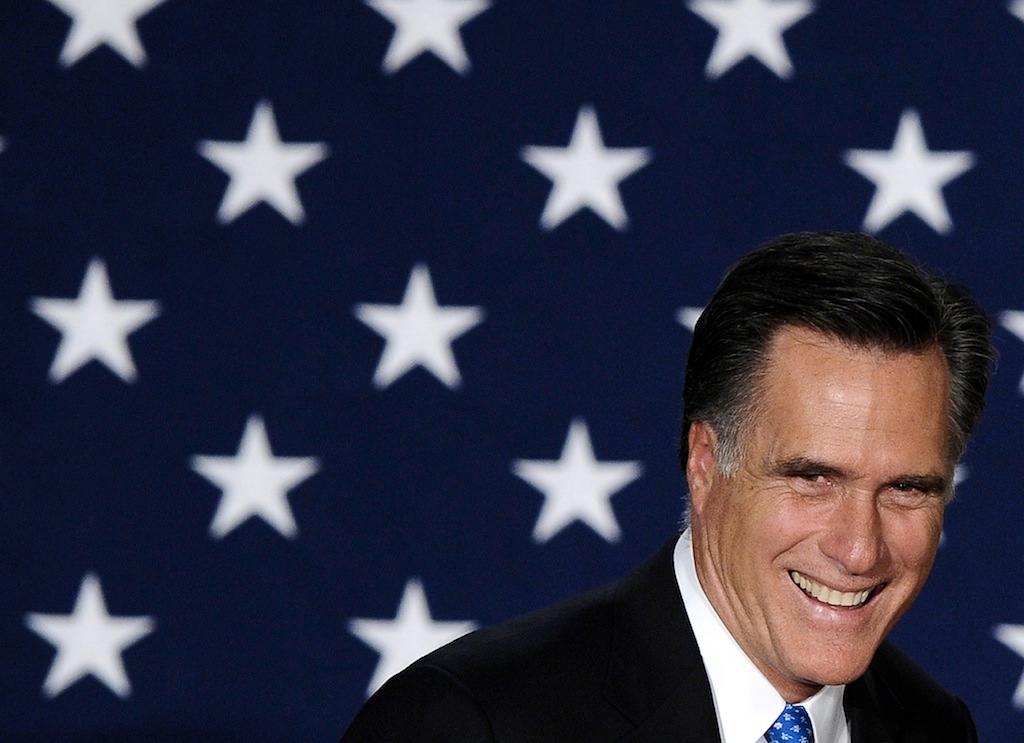Romney’s inequality gaffe in New Hampshire
Republican presidential hopeful Mitt Romney smiles as he arrives to speaks at his caucus night rally following republican caucuses in Des Moines, Iowa, on January 3, 2012.
BOSTON — Fresh off his narrow victory in the Iowa Caucuses, Mitt Romney appeared to score a major coup by landing an endorsement from Senator John McCain, one of the party's most recognizable figures. But the New Hampshire event where that endorsement took place could come back to haunt the GOP heir apparent.
The event itself was underwhelming. Only about 400 people showed up. The two Republicans had sparred during the 2008 primaries, and the chemistry between them was stiff, according to National Journal.
The gaffe occurred when Romney showed himself to be tone-deaf on a critical populist issue.
A spectator asked the candidate about America's income disparity. Romney dodged the question, challenging the crowd to name a country where the average income was higher.
Was he counting on the New Hampshire audience's ignorance? Did no one in the audience have a smartphone?
Ten countries have higher average incomes than the US. These include Singapore and Norway; a smattering of financial hubs (like Bermuda and Luxembourg); and small oil-rich places like Brunei and Qatar (the latter has a per capita GDP more than three times larger than the US). Obviously, few of these economies compare to the United States. So in principal, Romney had a point, even if, technically, Americans' income is not the highest.
But average income is largely irrelevant. The critical fact that Romney dodged is that inequality in the US is bad and getting worse. That's a point the fabulously-wealthy Republican front-runner brushes aside at his peril, if he wants to attract mainstream voters in these troubled times.
The Occupy movement has made America's beleaguered middle class a central theme in this election year, pointing out that the top one percent takes home about one-fifth of the national income, leaving the rest struggling to keep up. In these troubled economic times, even Americans who aren't sympathetic to Occupy can relate to the plight of hard-working wage earners who are losing their homes, or to young people burdened by college debt.
Here are some key facts about inequality:
- Among the 34 wealthiest major economies that belong to the OECD, America's wealth distribution is the sixth most unequal. Only Israel, Turkey, Korea, Chile and Mexico scored worse. These countries are still developing, or are relative newcomers to the upper echelons of wealth. That means their sizeable poor populations tend to still have a chance to improve their lot (perhaps with the exception of Israel, where politics help fuel inequality).
- Likewise, the CIA World Factbook puts the US at 40th from the bottom in terms of income disparity, among 140 countries that it reports on. One hundred countries are more equal than the US. America shares its neighborhood with Jamaica (38th), Bulgaria (39th), Cameroon (41st), and Iran (42nd). Yes, even Iran is slightly more egalitarian than the US. (Needless to say, Sweden is at the top.)
What Romney ignored is that America's average wealth is skewed by the country's fabulously rich. When Bill Gates walks into a bar, the per capita earnings of the bar increases dramatically.
Romney grew up as the priviledged son of an automotive CEO. As a young man, he used his wealth and status to make himself even richer. As the NY Times points out today, America's cherished economic mobility is increasingly a thing of the past. That's a real threat to the nation's identity.
So will Romney continue to dodge this question? Or does he have a plan to deal with it?
